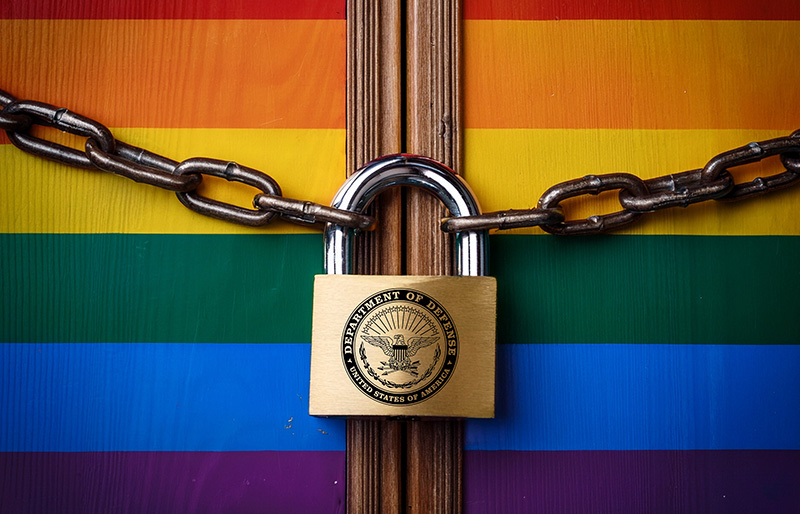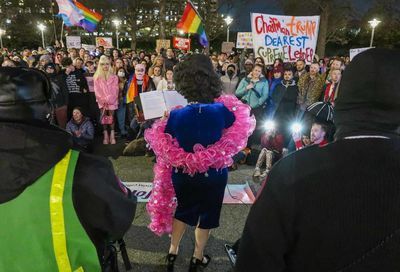Uganda’s President Signs Anti-Gay Bill into Law
Law criminalizes same-sex relations, with the death penalty for some offenses, and imposes 20-year sentences for pro-LGBTQ advocacy.

Ugandan President Yoweri Museveni has signed a sweeping bill into law imposing lifelong prison sentences — and, in some cases, the death penalty — for same-sex relations, drawing condemnation from the international community.
Museveni signed a revised version of the bill on Monday, May 29, that rolls back some of its more severe provisions.
For example, under the original version of the legislation, merely identifying as LGBTQ could land someone in prison. Under the new law, only those who engage in same-sex conduct can be prosecuted.
The revised version of the bill also rolls back provisions that would have required family, friends, and neighbors to report any suspected same-sex activity, even between consenting adults, to authorities or risk fines and imprisonment.
Under the revisions, a person may be fined 10 million Ugandan shillings or imprisoned for five years only if they do not report homosexual activity involving a minor.
Still, much of the bill’s harshest penalties remain intact.
The bill imposes life imprisonment for engaging in same-sex relations, with the death penalty for “aggravated homosexuality,” defined as engaging in same-sex relations while living with HIV, or various circumstances in which a person seduces or coerces someone else into engaging in same-sex acts.
The bill also imposes sentences from 7 to 14 years in prison for attempting to engage in same-sex relations, and imposes a sentence of up to 20 years in prison for anyone who “promotes” homosexuality, including advocating on behalf of LGBTQ rights, disseminating information that presents homosexuality in a facially-neutral or positive light, or portrays homosexuality as an acceptable lifestyle.
Critics say the latter sentence will effectively outlaw any human rights groups that advocate against laws criminalizing homosexuality.
Parliamentary Speaker Anita Among said in a statement that the president had “answered the cries of our people” in signing the bill, referring to widespread opposition within Ugandan society toward homosexuality.
“With a lot of humility, I thank my colleagues the Members of Parliament for withstanding all the pressure from bullies and doomsday conspiracy theorists in the interest of our country,” Among said.
LGBTQ advocates have argued that the bill is unnecessary, given that same-sex relations are already criminalized with life imprisonment by a law dating back to British colonial rule. More than 30 African nations still have similar laws on the books.
Other human rights advocates argue the law infringes on freedom of speech and freedom of expression through provisions criminalizing the “promotion” of homosexuality — which are so broadly written that any action by a person, nonprofit, or corporation that takes action considered to be “pro-LGBTQ” could be penalized under the law.
Ten individuals and a civil rights organization filed a petition challenging the law, demanding that it be struck down for criminalizing consensual same-sex relations, according to Bloomberg News.
A similar law that passed in 2014 was previously struck down by courts on a technicality involving parliamentary procedure.
The new law has already drawn widespread condemnation, especially from Western nations that are more sympathetic to LGBTQ civil rights.
“We are appalled that the draconian and discriminatory anti-gay bill is now law,” the United Nations Human Rights Office said in a statement. “It is a recipe for systematic violations of the rights of LGBT people and the wider population. It conflicts with the Constitution and international treaties and requires urgent judicial review.”
U.S. President Joe Biden condemned the law, calling for its repeal, and warning that the passage of the law represented the country “backsliding” on human rights.
“The enactment of Uganda’s Anti-Homosexuality Act is a tragic violation of universal human rights—one that is not worthy of the Ugandan people, and one that jeopardizes the prospects of critical economic growth for the entire country,” Biden said in a statement. “I join with people around the world — including many in Uganda — in calling for its immediate repeal.
“No one should have to live in constant fear for their life or being subjected to violence and discrimination. It is wrong,” Biden added.
“Since the Anti-Homosexuality Act was introduced, reports of violence and discrimination targeting Ugandans who are or are perceived to be LGBTQI+ are on the rise,” Biden continued.
“Innocent Ugandans now fear going to hospitals, clinics, or other establishments to receive life-saving medical care lest they be targeted by hateful reprisals. Some have been evicted from their homes or fired from their jobs. And the prospect of graver threats — including lengthy prison sentences, violence, abuse — threatens any number of Ugandans who want nothing more than to live their lives in safety and freedom.
Biden also said he would consider implementing “sanctions and restriction of entry into the United States against anyone involved in serious human rights abuses or corruption.”
U.S. Secretary of State Antony Blinken said in a separate statement that the U.S. government would consider visa restrictions against Ugandan officials and others, and ordered the State Department to update travel guidance warning U.S. citizens and businesses traveling to Uganda of the law’s ramifications. He also raised the possibility of cutting aid to the East African country, which receives about $1 billion yearly in U.S. government funding.
Among the investment programs that the Biden administration could review is money that Uganda receives through the U.S. President’s Emergency Plan for AIDS Relief (PEPFAR), and Uganda’s eligibility for the African Growth and Opportunity Act, a preferential trade program giving countries in sub-Saharan Africa preferential access to U.S. markets, and allows them to export products without tariffs, according to the international business publication Quartz.
Private businesses previously warned that the law could make them reconsider doing business in Uganda. The Open For Business coalition, which represents various companies, including Google, Microsoft, MasterCard, and Facebook owner Meta, warned in March that the anti-LGBTQ law would make the country less attractive to foreign companies — especially those with existing pro-LGBTQ policies, which could find themselves targeted by the law — and hinder the country’s economic growth.
Even U.S. Senator Ted Cruz — who has voted against any effort to advance LGBTQ rights or recognize same-sex unions while in Congress — condemned the law.
“This Uganda law is horrific & wrong. Any law criminalizing homosexuality or imposing the death penalty for ‘aggravated homosexuality’ is grotesque & an abomination,” Cruz tweeted. “ALL civilized nations should join together in condemning this human rights abuse.”
Global health groups warned that the law would likely exacerbate the HIV epidemic in the country, as potentially at-risk populations would no longer seek testing or treatment for fear of being prosecuted under the law.
“The Anti-Homosexuality Act 2023 will obstruct health education and the outreach that can help end AIDS as a public health threat. The stigma and discrimination associated with the passage of the Act has already led to reduced access to prevention as well as treatment services,” PEPFAR said in a joint statement with UNAIDS and the Global Fund to Fight AIDS, Tuberculosis and Malaria.
Anti-gay sentiment in Uganda has intensified in recent weeks following news coverage in which media outlets have alleged that same-sex relations, including instances of sodomy, are rampant in boarding schools, including a prestigious school for boys that was forcibly closed after a parent accused a teacher of abusing their son.
The bill’s expected passage, long before Museveni signed it into law, led many LGBTQ Ugandans to flee their home country.
“The news means that I will never see home again,” a 32-year-old gay asylum seeker, currently living at a refugee camp in Kenya, told The Washington Post about the new law. “I left Uganda in 2018; it was a scary time for me. I feel the fear, like that morning I ran away from my home. I am in the refugee camp at the moment and never felt so disillusioned in my life.”
Another refugee, Jude, age 38, told the newspaper he feels “extremely scared,” adding: “It’s a tragedy on our story and entire community. I have no option [to remain] in Uganda.”
Support Metro Weekly’s Journalism
These are challenging times for news organizations. And yet it’s crucial we stay active and provide vital resources and information to both our local readers and the world. So won’t you please take a moment and consider supporting Metro Weekly with a membership? For as little as $5 a month, you can help ensure Metro Weekly magazine and MetroWeekly.com remain free, viable resources as we provide the best, most diverse, culturally-resonant LGBTQ coverage in both the D.C. region and around the world. Memberships come with exclusive perks and discounts, your own personal digital delivery of each week’s magazine (and an archive), access to our Member's Lounge when it launches this fall, and exclusive members-only items like Metro Weekly Membership Mugs and Tote Bags! Check out all our membership levels here and please join us today!

























You must be logged in to post a comment.